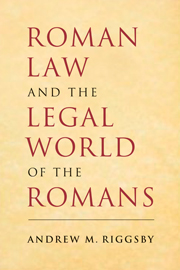Book contents
- Frontmatter
- Contents
- ROMAN LAW AND THE LEGAL WORLD OF THE ROMANS
- 1 Introduction
- 2 Roman History – The Brief Version
- 3 Sources of Roman Law
- 4 Sources for Roman Law
- 5 The Legal Professions
- 6 Legal Education
- 7 Social Control
- 8 Legal (In)equality
- 9 Writing and the Law
- 10 Status
- 11 Civil Procedure
- 12 Contracts
- 13 Ownership and Possession
- 14 Other Rights over Property
- 15 Inheritance
- 16 Women and Property
- 17 Family Law
- 18 Delict
- 19 Crimes and Punishments
- 20 Religious Law
- 21 Law in the Provinces
- 22 Conclusion
- Documents
- Glossary
- Further Reading
- Index
17 - Family Law
Published online by Cambridge University Press: 05 June 2012
- Frontmatter
- Contents
- ROMAN LAW AND THE LEGAL WORLD OF THE ROMANS
- 1 Introduction
- 2 Roman History – The Brief Version
- 3 Sources of Roman Law
- 4 Sources for Roman Law
- 5 The Legal Professions
- 6 Legal Education
- 7 Social Control
- 8 Legal (In)equality
- 9 Writing and the Law
- 10 Status
- 11 Civil Procedure
- 12 Contracts
- 13 Ownership and Possession
- 14 Other Rights over Property
- 15 Inheritance
- 16 Women and Property
- 17 Family Law
- 18 Delict
- 19 Crimes and Punishments
- 20 Religious Law
- 21 Law in the Provinces
- 22 Conclusion
- Documents
- Glossary
- Further Reading
- Index
Summary
The family seems to be an important institution within all societies. So it is not surprising that societies, modern or Roman, with sophisticated legal systems have elaborate rules about those families. They regulate, for instance, eligibility for marriage or transfer of wealth by inheritance. But the general similarity can be misleading. While the importance of “family” may be universal, ideals and even the definition of that term can differ considerably. The Roman word familia, for instance, usually means “household” or even “the slaves of the household.” Latin does not have a word that clearly refers to what we today call the (nuclear) family. As a result, the shape of Roman family law can be surprisingly different from modern versions. For instance, it has very little to say about issues like grounds for divorce, alimony, child support, and child custody. In some instances this is because the Romans thought the questions were easier to answer than we do; in other cases, it is because they didn't ask the same questions in the first place. Other issues, such as the authority of a father over his adult children or treatment of dowry, loomed much larger in Rome than they do today. Over time, the shape of the Roman family (and of marriage in particular) changed. It was affected by several factors. One of the most dramatic of these was the rise of Christianity. The final section will look at the legal consequences of that transformation.
- Type
- Chapter
- Information
- Roman Law and the Legal World of the Romans , pp. 173 - 186Publisher: Cambridge University PressPrint publication year: 2010



